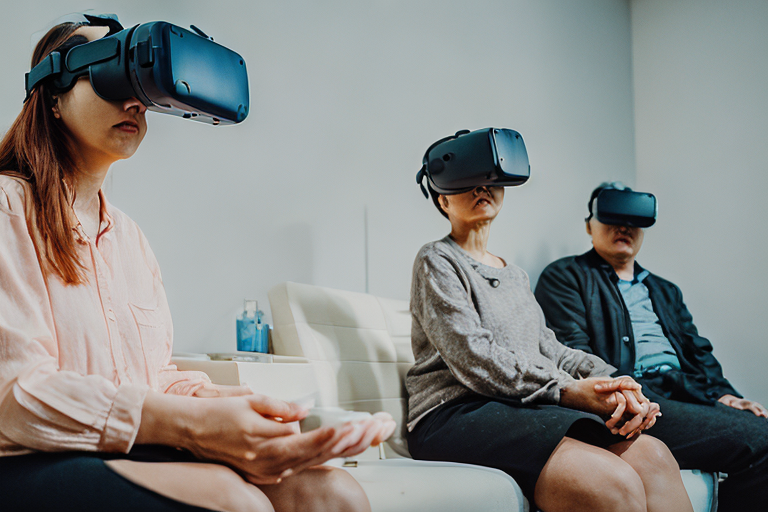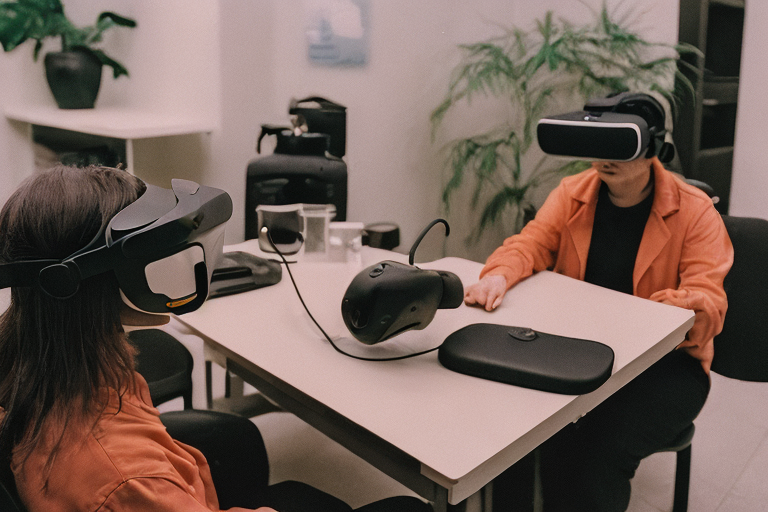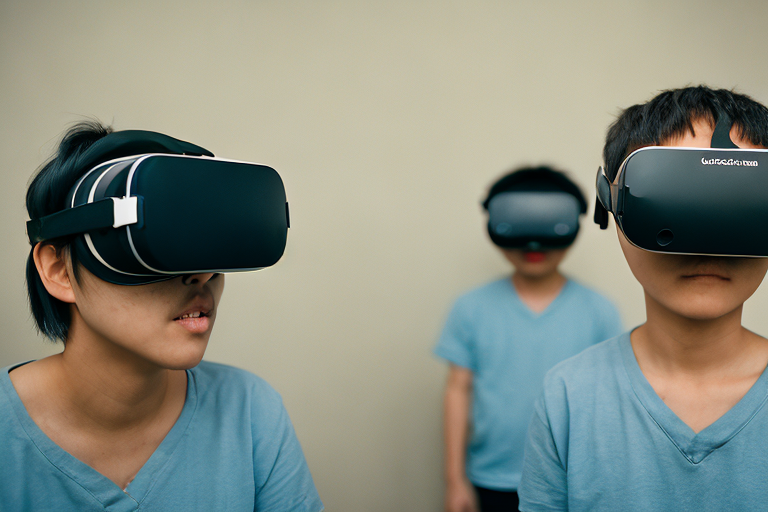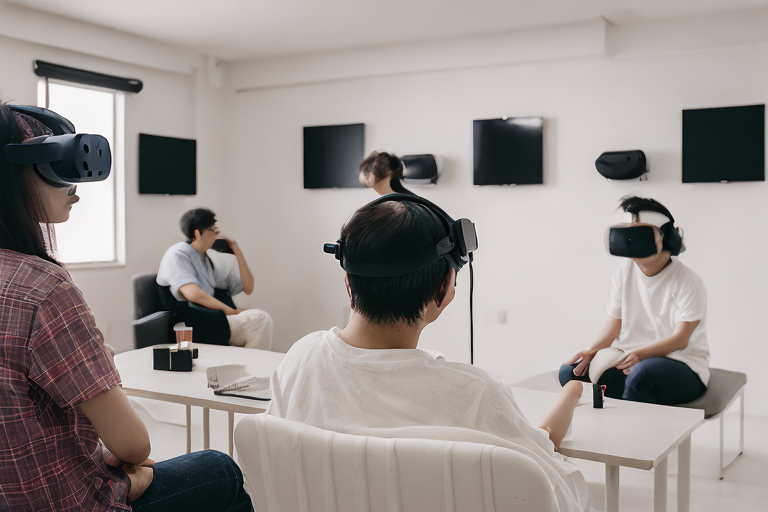소셜 서비스 산업의 가상 현실(VR) : 사례 관리 및 지원 개선(Virtual Reality in the Social Ser…
본문

가상 현실 기술은 사례 관리와 도움이 필요한 사람들에 대한 지원을 개선함으로써 사회 서비스 산업에 큰 영향을 미칠 수 있는 잠재력을 가지고 있습니다. 이는 사회복지사가 다양한 시나리오를 경험하고 고객에게 보다 효과적이고 공감적인 지원을 제공할 수 있는 VR 시뮬레이션을 사용하여 달성할 수 있습니다.
소셜 서비스에서 VR을 사용하는 한 가지 예는 한국의 서울시가 VR 시뮬레이션을 사용하여 장애인들을 위한 직업 훈련을 제공하는 프로젝트입니다. 가상현실 시뮬레이션은 그들이 안전하고 통제된 환경에서 직업 기술을 연습할 수 있게 해주며, 그들의 불안을 줄이고 성공적인 고용 기회를 증가시킵니다.
직업 훈련 외에도, VR 기술은 치료와 상담에도 사용될 수 있습니다. 예를 들어, VR 노출 치료는 공포증이나 외상 후 스트레스 장애(PTSD)를 가진 사람들이 통제된 환경에서 두려움에 맞서도록 도울 수 있습니다.

VR 기술이 사회 서비스 산업에 혜택을 줄 수 있는 또 다른 방법은 사회 복지사와 의료 인력 및 법 집행 기관과 같은 다른 전문가 간의 의사 소통과 협업을 개선하는 것입니다. VR은 전문가들이 만나 협력할 수 있는 공유 가상 공간을 만들어 의사 결정 과정을 간소화하고 전반적인 진료 품질을 개선할 수 있습니다.
결론적으로, 가상 현실 기술은 도움이 필요한 사람들에게 효과적이고 효율적인 지원을 제공함으로써 사회 서비스 산업을 크게 향상시킬 수 있는 잠재력을 가지고 있습니다. VR 시뮬레이션을 사용하여 사회 복지사는 다른 전문가와의 협업 및 교육을 개선하여 궁극적으로 고객에게 더 나은 결과를 제공할 수 있습니다.
소셜 서비스 산업에서 가상 현실을 사용하면 사례 관리 및 지원이 제공되는 방식에 혁명을 일으킬 수 있습니다. 가상 현실은 사회복지사 및 기타 지원 전문가에게 몰입형 및 대화형 시뮬레이션을 제공함으로써 도움이 필요한 사람들에게 효과적인 지원을 제공하는 데 필요한 기술과 지식을 향상시키는 데 도움이 될 수 있습니다. 특히 가상 현실을 사용하여 복잡하고 까다로운 상황을 시뮬레이션할 수 있으므로 지원 전문가가 실제 시나리오에서 대응을 연습하고 더 많은 정보를 바탕으로 의사 결정을 내릴 수 있습니다.

이것의 한 예는 사회복지사들이 위탁 가정에서 아이들의 경험을 더 잘 이해하도록 돕기 위해 한국에서 사용되는 가상 현실 프로그램입니다. 한국 보건복지부에 의해 개발된 이 프로그램은 사회복지사들이 가상의 아이들과 상호작용하고 그들이 직면한 도전들을 직접 볼 수 있는 가상의 환경을 제공합니다. 가상 현실을 사용함으로써, 사회 복지사들은 위탁 보육 아동들의 필요와 경험을 더 깊이 이해하고 그들을 지원하는 방법에 대해 더 많은 정보에 입각한 결정을 내릴 수 있습니다.
결론적으로, 소셜 서비스 산업에서 가상 현실의 사용은 지원 전문가들에게 보다 효과적인 지원과 관리를 제공하는 데 필요한 도구와 리소스를 제공함으로써 판도를 바꿀 수 있는 잠재력을 가지고 있습니다. 지속적인 투자와 개발로 가상 현실은 사회 서비스 산업에서 없어서는 안 될 도구가 될 수 있으며, 도움이 필요한 사람들의 삶을 개선하고 전 세계 지역사회에 진정한 변화를 줄 수 있습니다.
사례 관리 및 지원을 개선하기 위해 소셜 서비스 산업에서 가상 현실(VR)이 점점 더 많이 활용되고 있습니다. VR 기술은 사회복지사들에게 고객의 평가와 치료에 도움이 될 수 있는 몰입감 있고 상호작용적인 경험을 제공할 수 있습니다. 이를 통해 실제 시나리오를 시뮬레이션하여 고객의 상황과 요구사항을 보다 정확하게 파악할 수 있습니다. VR을 사용함으로써, 사회복지사들은 또한 고객들에게 더 안전하고 통제된 환경을 제공하여, 상해의 위험을 줄이거나 충격적인 경험에 노출되는 것을 줄일 수 있습니다.

한국에서는, Mindich라는 회사가 정신 건강 상태를 가진 고객들을 지원하기 위해 사회복지사들을 위한 VR 플랫폼을 개발했습니다. 이 플랫폼은 고객이 안전하고 통제된 환경에서 두려움을 경험하고 극복할 수 있도록 대화형 시뮬레이션 및 치료 세션을 제공합니다. 이러한 유형의 VR 치료는 불안과 우울증의 증상을 줄이는 데 효과적인 것으로 나타났습니다.
전반적으로, VR 기술은 사회복지사들이 고객들에게 지원과 치료를 제공하는 방식에 혁명을 일으킬 수 있는 잠재력을 가지고 있습니다. VR은 보다 몰입적이고 상호작용적인 경험을 허용함으로써 고객의 상황과 요구에 대한 더 깊은 이해를 제공하여 보다 효과적이고 효율적인 지원으로 이어질 수 있습니다. 사회 서비스 산업에서 VR의 사용은 도움이 필요한 개인의 삶을 크게 개선할 수 있는 유망한 발전입니다.
Virtual reality technology has the potential to greatly impact the social services industry by improving case management and support for those in need. This can be achieved through the use of VR simulations that enable social workers to experience different scenarios and provide more effective and empathetic support to clients.
One example of the use of VR in social services is a project by the Seoul Metropolitan Government in South Korea, which utilizes VR simulations to provide job training for people with disabilities. The VR simulations enable them to practice job skills in a safe and controlled environment, reducing their anxiety and increasing their chances of successful employment.
In addition to job training, VR technology can also be used in therapy and counseling. For example, VR exposure therapy can help individuals with phobias or post-traumatic stress disorder (PTSD) confront their fears in a controlled environment.
Another way that VR technology can benefit the social services industry is by improving communication and collaboration between social workers and other professionals, such as medical personnel and law enforcement. VR can create a shared virtual space where professionals can meet and work together, streamlining the decision-making process and improving the overall quality of care.
In conclusion, virtual reality technology has the potential to greatly improve the social services industry by providing effective and efficient support to those in need. Through the use of VR simulations, social workers can provide better training, therapy, and collaboration with other professionals, ultimately leading to better outcomes for clients.
The use of virtual reality in the social services industry has the potential to revolutionize the way case management and support are delivered. By providing social workers and other support professionals with immersive and interactive simulations, virtual reality can help improve the skills and knowledge they need to provide effective support to those in need. In particular, virtual reality can be used to simulate complex and challenging situations, allowing support professionals to practice their responses and make more informed decisions in real-world scenarios.
One example of this is a virtual reality program used in South Korea to help social workers better understand the experiences of children in foster care. The program, which was developed by the Korean Ministry of Health and Welfare, provides a virtual environment where social workers can interact with virtual children and see first-hand the challenges they face. By using virtual reality, social workers can gain a deeper understanding of the needs and experiences of children in foster care and make more informed decisions about how to support them.
In conclusion, the use of virtual reality in the social services industry has the potential to be a game-changer, providing support professionals with the tools and resources they need to deliver more effective support and care. With continued investment and development, virtual reality could become an indispensable tool in the social services industry, helping to improve the lives of those in need and make a real difference in communities around the world.
Virtual reality (VR) has been increasingly utilized in the social services industry to improve case management and support. VR technology can provide social workers with immersive and interactive experiences that can help in the assessment and treatment of clients. This can help to simulate real-life scenarios, providing a more accurate understanding of the client's situation and needs. By using VR, social workers can also provide a safer and more controlled environment for clients, reducing the risk of harm or exposure to traumatic experiences.
In Korea, a company called Mindich has developed a VR platform for social workers to support clients with mental health conditions. The platform provides interactive simulations and therapy sessions that allow clients to experience and overcome their fears in a safe and controlled environment. This type of VR therapy has been shown to be effective in reducing symptoms of anxiety and depression.
Overall, VR technology has the potential to revolutionize the way social workers provide support and treatment to their clients. By allowing for more immersive and interactive experiences, VR can provide a deeper understanding of the client's situation and needs, leading to more effective and efficient support. The use of VR in the social services industry is a promising development that could greatly improve the lives of individuals in need.






















댓글목록 0